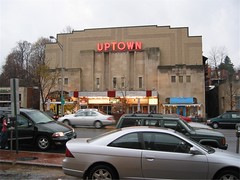Be careful what you wish for/religious freedom/RLUIPA
(Flickr photo of the Uptown Theater by Zacklur.)
This article from the Blade, "Anti-gay church eyes D.C. theater for campus: Cleveland Park residents divided over plan to lease the Uptown," was sent to the historicwashington e-list.
I think that renting theaters is great in terms of providing additional revenue streams to help preserve neighborhood-based theaters. Plus I would rather a church use a facility like this for a few hours/week, rather than build their own facility that sits empty for 160 hours/week. FYI, at the most, I am agnostic. Religion hasn't built the base of my value system.
Anyway, some people are against this use for zoning reasons. Others oppose the church use because of the philosophy of the church. For other reasons, I think this is a dangerous path to take. (For one, the first amendment calls for a separation of church and state...)
Here's what I wrote:
I think that renting a theater is a normal use by a theater, although maybe for such an intense and regular use, a transportation demand management plan should be required.
The danger in fighting the church because of its theological approach is that this raises, rightly, a response from the church involving the Religous Land Use and Institutionalized Persons Act (RLUIPA), a federal law "guaranteeing" equal treatment of religious institutions vis-v-vis local laws, including zoning.
I think too often churches interpreting this law believe that it means that churches deserve special, not normal, treatment. Montgomery County is dealing with zoning challenges on this in the Ag Preserve area, where megachurches are trying to open big religious campuses. Baltimore acceded to the demolition of the Belvedere apartment building by the Catholic Church because they said they couldn't survive--I didn't agree--a RLUIPA challenge. Etc.
But clearly (and I am not a lawyer), a major challenge to the proposed use by the McLean Bible Church could trigger the church's use of this law.
Likely they would win if they pursued such a case.
Just like I think that any loss on creating historic districts (and related matters) diminishes the preservation agenda generally, I think that losing on RLUIPA due to a really bad original decision, sets up preservationists and neighborhoods to many more RLUIPA challenges, ranging from tearing down houses for parking lots to how buildings are maintained (i.e., Shiloh) relative to a church's mission (as they define it, not how it might be defined objectively).
I can't claim to know the zoning regulations in and out like some others, but I can't see how the renting of a church for a service is that special of a use.
E.g., what kind of certificate of occupancy is required for the church, the one that owns Ebenezer's Coffee Shop on Capitol Hill, to do this at Union Station? (They also do this in Arlington.)
Website for pro-RLUIPA legal challenges.
Text of the RLUIPA law
Labels: civic engagement, historic preservation, protest, zoning




0 Comments:
Post a Comment
<< Home